
"Water is the driving force of all nature". Leonardo da Vinci
There was a prolonged drought from June to August, reservoirs, rivers and water tables fell and many water authorities implemented hosepipe bans.
Farmers here are having to irrigate crops earlier and for longer. Many are creating their own reservoirs to store water to use in dry spells from small ponds catching rainwater from glasshouses to large artificial lakes.
Having self sufficient water supplies was a necessity in the past and is becoming so again. How did we arrive at the system that we now use to take care of the irrigation needs on our smallholding? We'll also examine how we calculated our water needs, how we designed our catchment and storage system and share how we use the water that we've gathered.
CALCULATING OUR WATER NEEDS
Our approach to calculating our water needs was simple. We water with both watering cans (often in the greenhouses and poly tunnels) and with hoses. Every watering can is 10 litres of water. Six cans a day is 60 litres. A water butt holds 300 litres so...wait...just five days supply!
We also have an extensive vegetable garden, two fruit cages, many pots, gooseberry and rhubarb beds etc. On average that takes half an hour of watering a day if we use a hose. We looked up how much water a hose uses and found that a normal garden hose uses 1,000 litres an hour. To say we were shocked was an understatement. We use 500 litres watering for just half an hour a day in Summer. Honestly, we checked the figures repeatedly because it's thousands of litres a week! Even with that sort of watering our onions were very small this year which we put down to prolonged dry weather.
This story is from the Spring 2023 edition of The Country Smallholder.
Start your 7-day Magzter GOLD free trial to access thousands of curated premium stories, and 9,000+ magazines and newspapers.
Already a subscriber ? Sign In
This story is from the Spring 2023 edition of The Country Smallholder.
Start your 7-day Magzter GOLD free trial to access thousands of curated premium stories, and 9,000+ magazines and newspapers.
Already a subscriber? Sign In
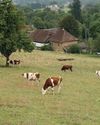
How to Buy a Smallholding in France- Long-time smallholder Lorraine Turnbull looks at the practicalities of moving to rural France
Aspiring smallholders are continually thwarted by the prices of smallholdings and property with land located within the UK. Even the humblest croft in Scotland comes with a substantial price tag and conditions which would make even an adventurous wannabee consider carefully. But all is not lost. For those willing to take the adventure of a lifetime, there is always Europe, and one of the most popular places is France.

Meet the Bournemouth goats and their supporters
These capricious animals are hard workers preserving the natural habitat

Still warm enough to sit outside with a Pizza
Henrietta Balcon uses fresh figs to create an unusual dish at Harvest time
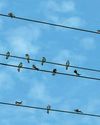
Goodbye to the birds of spring and summer
If you look and listen you might be able to see them preparing to leave says The RSPB

Get ready for the colder weather in the warmth of late summer
Claire Waring advises on doing the best to make sure your colonies survive until next spring
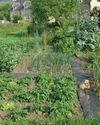
Preparing the Veg Patch for Winter
Lee Senior says, a well-run plot can excitingly continue to produce good quality, tasty, fresh food for much of winter
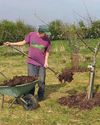
Time to prepare to plant your orchard
Wade Muggleton, smallholder and author of The Orchard Book, shares his practical experience so you can create your own fruit collection
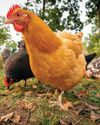
Choosing feed for the autumn
As autumn approaches, Joanna Palmer, nutritionist at the Smallholder Range, offers advice on choosing the right feed to support your adult birds through their annual moult and ensure your young birds grow and finish well at this time of the year.
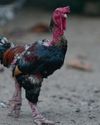
Vet advice from an experienced poultry vet
Reflecting on how much the humble hen has helped people world wide plus advice on stopping the scourge of red mite

Give your hens some support
Paul Donovan looks at the right and wrong ways of handling birds